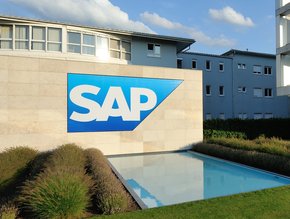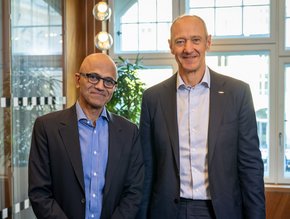Building bridges between management and productivity

The pandemic undoubtedly ushered in a new era of hybrid working and heightened connectivity.
While supporters of this new working model are full of praise for the benefits of reduced commuting times and a better work-life balance, others are not convinced.
These detractors believe team collaboration is suffering and that remote work is impacting teams’ ability to effectively share, organise and structure the information needed for their tasks.
In fact, Smartsheet’s recent Future of Work Management research revealed 40% of difficulties encountered in project management can be traced back to the impact of remote work.
Sarfraz Ali, VP and General Manager of EMEA at Smartsheet, says this is not necessarily because the hybrid model doesn’t work, but that leadership teams aren’t doing enough to provide staff with the resources and tools required to be successful.
“Our research shows a worrying disparity between C-level leaders and staff in their perceptions around understaffing and the allocation of resources for addressing common project complications,” adds Ali.
“This divide has given rise to what we call ‘citizen project managers’ – individuals who voluntarily take on the responsibilities of a project manager even when it's not officially part of their job description.”
Four in five of workers surveyed by Smartsheet admitted to being citizen project managers at one point or another, contributing to the heightened pressure they are feeling.
What’s more, around 85% of these citizen project managers expressed feelings of being overwhelmed by the pace of projects.
Addressing the global resource recession
Amid a notable divide between C-suite executives and their employees, organisations must focus on offering the appropriate tools for everyone.
Taking a proactive approach can not only boost outcomes, but also enhance the overall work environment.
“By aligning resources with team needs,” says Ali, “organisations demonstrate a commitment to their team's success and wellbeing, fostering a culture of collaboration, productivity and accomplishment while contributing to sustained growth and success.”
One untapped resource is the implementation of work management software, which holds significant potential to transform how work is managed and executed.
However, Smartsheet’s research found just 38% of employees believe their company is actively investing in the essential tools required to effectively tackle project management challenges.
Ali continues: “This underlines a critical opportunity for organisations to harness the power of modern tools and narrow the divide between employee expectations and resource allocation, ultimately fostering streamlined and successful work.
“Beyond enhancing project oversight, work management software also helps in accurately gauging the progress made and identifying potential bottlenecks. This not only enhances efficiency, but also contributes to improved team morale and overall organisational growth.”
Moving focus away from deadlines
On the face of things, Smartsheet’s discovery that a significant majority of workers feel overwhelmed by the pace of projects and the deadlines they work to may prompt companies to consider extending those deadlines.
However, deadlines are also recognised as important drivers of efficiency and have proven effective in the past when it comes to boosting motivation levels and keeping teams accountable.
Ali insists that simply relaxing deadlines is not the solution, and emphasises the need to strike an optimum balance between deadlines and capacity.
“A longer deadline may not mean the project will succeed, just as a shorter deadline doesn’t mean the team is set up for failure,” he says.
“Organisations need to shift their focus onto internal processes by establishing a reliable workflow, as well as communication and collaboration with the team. It is the dysfunction of these day-to-day processes that really determines the outcome of a project, not the ability to meet the deadline itself.
“By prioritising streamlined processes and fostering transparent communication, organisations can fortify the foundation for successful outcomes.”
Implementing robust processes
At the core of project success lies the establishment of robust processes, argues Ali.
He points out that, while we often hear about learning from others' mistakes, it's in the workplace where this wisdom truly finds its application. A huge majority (94%) of employees report relying on insights from previous projects to effectively perform their tasks.
As discussed, a major linchpin of success is the processes in place and determining whether a workstream thrives or falters, which essentially hinges on leveraging past experiences to inform decisions.
“However, organisations often fail to internally communicate the successes and, more importantly, the failures, as learning opportunities for employees,” Ali goes on.
“This results in teams grappling with unnecessary complex situations, repeating past mistakes or investing extra time in tasks that could have been streamlined with the right information at hand.”
Using technology such as work management platforms is certainly one way to alleviate this friction within businesses, often leading to refined workflows and superior results.
Once reliable and repeatable processes have been developed, exploring ways to optimise time management by reducing manual processes becomes paramount.
Automation helps with visibility, too. Among those who use work management software, 45% say they can access information from projects that might affect them, compared to 21% who don’t use such software.
“In a landscape reshaped by hybrid work dynamics, the imperative to harmonise productivity with employee wellbeing has taken centre stage,” Ali concludes.
“As organisations look ahead, it's clear that success extends beyond mere project completion; it encompasses an ecosystem where teams thrive, work prospers and innovation grows.
“The expanding role of technology, particularly work management software, presents a compelling opportunity to bridge the gap between employee expectations and organisational outcomes.”
******
For more business insights, check out the latest edition of Business Chief UK & Europe and be sure to follow us on LinkedIn and Twitter.
You may also be interested in the Business Chief US & Canada website.
******
BizClik is a global provider of B2B digital media platforms that cover executive communities for CEOs, CFOs and CMOs, as well as leaders in Sustainability, Procurement & Supply Chain, Technology & AI, Cyber, FinTech & InsurTech. We also cover industries including Manufacturing, Mining, Energy, EV, Construction, Healthcare and Food & Drink.
BizClik, based in London, Dubai and New York, offers services such as content creation, advertising and sponsorship solutions, webinars and events.
- Leadership development remains critical to successLeadership & Strategy
- Businesses 'running blind' in the fight against cyber crimeDigital Strategy
- Five Minutes With: Björn Dufwenberg, MD at Strat7 AdvisoryLeadership & Strategy
- How analogous inspiration can solve your strategic deadlockLeadership & Strategy






